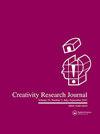The Construct Validity of Creativity: Empirical Arguments in Favor of Novelty as the Basis for Creativity
IF 2.5
3区 心理学
Q2 PSYCHOLOGY, EDUCATIONAL
引用次数: 7
Abstract
ABSTRACT In scientific research on creativity, there has been considerable debate concerning the criteria by which a production can be judged more or less creative, that is, about the definition of creativity. The most frequent definition – the standard definition – incorporates the criteria of novelty and value. However, other definitions, based on a single criterion or on more than two criteria, have also been proposed. Much of the discussion of this issue has been based on semantic analysis, a logical analysis of the concepts involved and the usefulness of the various proposed criteria. In this article, question of the necessary and sufficient criteria for defining creativity is approached from an empirical (i.e., psychometric) perspective. The studies that are examined here converge on the idea that the standard definition is not internally consistent, because its two proposed criteria (i.e., novelty and value) are largely independent. Moreover, judgments of the creativity of an object seem to be explained mainly by its novelty, which suggests the possible sufficiency of that criterion. These results are consistent with the intentional novelty definition proposed recently by Robert W. Weisberg.创造力的建构效度:支持新颖性作为创造力基础的实证论证
摘要在关于创造力的科学研究中,关于判断一部作品是否具有创造性的标准,即创造力的定义,一直存在着相当大的争论。最常见的定义——标准定义——包含了新颖性和价值的标准。然而,也提出了基于单一标准或两个以上标准的其他定义。对这个问题的大部分讨论都是基于语义分析、对所涉及概念的逻辑分析以及各种拟议标准的有用性。在这篇文章中,定义创造力的必要和充分的标准是从经验(即心理测量)的角度来探讨的。这里审查的研究集中在这样一个观点上,即标准定义在内部并不一致,因为它提出的两个标准(即新颖性和价值)在很大程度上是独立的。此外,对物体创造性的判断似乎主要是由其新颖性来解释的,这表明该标准可能是充分的。这些结果与Robert W.Weisberg最近提出的有意新颖性定义一致。
本文章由计算机程序翻译,如有差异,请以英文原文为准。
求助全文
约1分钟内获得全文
求助全文
来源期刊

Creativity Research Journal
Multiple-
CiteScore
5.10
自引率
7.70%
发文量
52
期刊介绍:
Creativity Research Journal publishes high-quality, scholarly research capturing the full range of approaches to the study of creativity--behavioral, clinical, cognitive, crosscultural, developmental, educational, genetic, organizational, psychoanalytic, psychometrics, and social. Interdisciplinary research is also published, as is research within specific domains (e.g., art, science) and research on critical issues (e.g., aesthetics, genius, imagery, imagination, incubation, insight, intuition, metaphor, play, problem finding and solving). Integrative literature reviews and theoretical pieces that appreciate empirical work are extremely welcome, but purely speculative articles are not published. Readers are encouraged to send commentaries, comments, and evaluative book reviews.
 求助内容:
求助内容: 应助结果提醒方式:
应助结果提醒方式:


